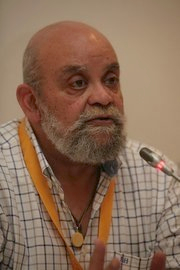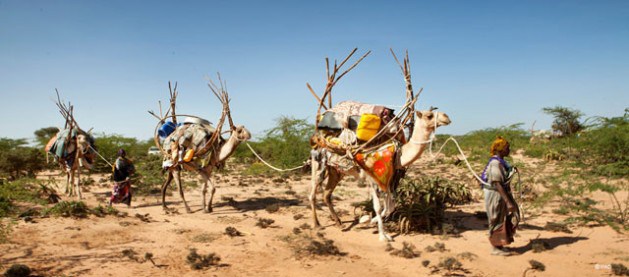By Baher Kamal*
“Every second, one person is displaced by disaster,” the Oslo-based Norwegian Refugee Council (NRC) reports. “In 2015 only, more than 19.2 million people fled disasters in 113 countries. “Disasters displace three to ten times more people than conflict and war worldwide.”
As climate change continues, it will likely lead to more frequent and severe natural hazards; the impact will be heavy, warns this independent humanitarian organisation providing aid and assistance to people forced to flee.
“On average, 26 million people are displaced by disasters such as floods and storms every year. That’s one person forced to flee every second.”
“Climate change is our generation’s greatest challenge,” says Jan Egeland, Secretary General of the Norwegian Refugee Council, which counts with over 5,000 humanitarian workers across more than 25 countries.
The climate refugees and migrants add to the on-going humanitarian emergency. “Not since World War II have more people needed our help,” warned the secretary general of the Norwegian Refugee Council Jan Egeland, who held the post of UN undersecretary general for Humanitarian Affairs and Emergency Relief (2003-2006).
Egeland –who was one of the most active, outspoken participants in the World Humanitarian Summit (Istanbul May 23-24)– also stressed that the humanitarian sector is failing to protect civilians.
“I hope that world leaders can ask themselves if they can at least stop giving arms, giving money to those armed groups that are systematically violating the humanitarian law, and bombing hospitals and schools, abusing women and children,” he said to IPS during the World Humanitarian Summit.
For its part, the International Organisation for Migration (IOM) forecasts 200 million environmental migrants by 2050, moving either within their countries or across borders, on a permanent or temporary basis. Many of them would be coastal population.
On this, the United Nations Environment Programme (UNEP) warns that coastal populations are at particular risk as a global rise in temperature of between 1.1 and 3.1 degrees C would increase the mean sea level by 0.36 to 0.73 meters by 2100, adversely impacting low-lying areas with submergence, flooding, erosion, and saltwater intrusion.
An estimated 83,100 people remain displaced and in need of humanitarian assistance in Wau, South Sudan. Credit: IOM
In a recent interview with IPS Nairobi correspondent Manipadma Jena, the director general of the International Organisation for Migration, William Lacy Swing, said that coastal migration is starting already but it is very hard to be exact as there is no good data to be able to forecast accurately.
“We do not know. But it is clearly going to figure heavily in the future. And it’s going to happen both in the low-lying islands in the Pacific and the Caribbean, and in those countries where people build houses very close to the shore and have floods every year as in Bangladesh.”
“It is quite clear that we will have more and more conflicts over shortages of food and water that are going to be exacerbated by climate change,” Lacy Swing warned.
Political crises and natural disasters are the other major drivers of migration today, he said to IPS in the interview.
Lacy Swing confirmed the fact that climate victims now add to record 60 million people who are fleeing war and persecution.
“We have never had so many complex and protracted humanitarian emergencies now happening simultaneously from West Africa all the way to Asia, with very few spots in between which do not have some issue. We have today 40 million forcibly displaced people and 20 million refugees, the greatest number of uprooted people since the Second World War.”
On 25 July, the United Nations General Assembly unanimously adopted a resolution approving an agreement to make the International Organisation for Migration part of the UN system.
Founded in the wake of the World War II to resettle refugees from Europe, OIM celebrates its 65th anniversary in December of this year.
FAO and UNHCR prepared a handbook that will help mitigate the impact of displaced people on forest resources. The handbook aims to help displaced people access fuel for cooking food while reducing environmental damage and conflicts with local communities. Credit: FAO/UNHCR
“Migration is at the heart of the new global political landscape and its social and economic dynamics. At a time of growing levels of migration within and across borders, a closer legal and working relationship between the United Nations and IOM is needed more than ever,” said the United Nations Secretary-General Ban Ki-moon in a statement welcoming the Assembly’s decision.
IOM, which assisted an estimated 20 million migrants in 2015, is an intergovernmental organisation with more than 9,500 staff and 450 offices worldwide
“We are living in a time of much tragedy and uncertainty. This agreement shows Member States’ commitment to more humane and orderly migration that benefits all, where we celebrate the human beings behind the numbers,” IOM Director General William Lacy said.
Through the agreement, the UN recognises IOM as an “indispensable actor in the field of human mobility.” IOM added that this includes protection of migrants and displaced people in migration-affected communities, as well as in areas of refugee resettlement and voluntary returns, and incorporates migration in country development plans.
The agreement paves the way for the agreement to be signed by Secretary-General Ban-Ki Moon and Swing at the UN Summit for refugees and migrants on 19 September, which will bring together UN member states to address large movements of refugees and migrants for more humane and coordinated approach.
*Baher Kamal’s report was published in IPS. Go to Original.
 *Baher Kamal, Egyptian-born, Spanish-national secular journalist. He is founder and publisher of Human Wrongs Watch. Kamal is a pro-peace, non-violence, human rights, coexistence defender, with more than 45 years of professional experience.
*Baher Kamal, Egyptian-born, Spanish-national secular journalist. He is founder and publisher of Human Wrongs Watch. Kamal is a pro-peace, non-violence, human rights, coexistence defender, with more than 45 years of professional experience.Baher Kamal is also Senior Advisor to the Director General of international news agency IPS on Africa and the Middle East.
More articles by Baher Kamal in Human Wrongs Watch:
400 Million People Live with Hepatitis But They Do Not Know
Rights of Indigenous Peoples ‘Critical’ to Combat Climate Change
Forests: To Farm or Not to Farm? That’s the Question!
‘Monster’ El Niño Subsides, ‘Monster’ La Niña Hitting Soon
‘Modern World Is Chaotic, Confused; Human Security a Must’
Xenophobic Rhetoric, Now Socially and Politically ‘Acceptable’ ?
‘Hate Is Mainstreamed, Walls Are Back, Suspicion Kills’
What If Turkey Drops Its “Human Bomb” on Europe?
Humanitarian Aid – Business As Unusual?
World Oceans Day – A Death Sea Called Mediterranean
The Humanitarian Clock Is Ticking, The Powerful Feign Deafness
Humanitarian Summit, The Big Fiasco
Humanitarian Summit: Too Big to Fail?
Humanitarian Summit Aims to Mobilise Up to 30 Billion Dollars
Africa, Resolved to Address African Problems With African Solutions
‘We Cannot Keep Jumping from Crisis to Crisis’
‘Human Suffering Has Reached Staggering Levels’
Now 1 in 2 World’s Refugees Live in Urban Areas
Middle East – The Mother of All Humanitarian Crises
Mideast: 1 in 3 Pays Bribe to Access Basic Public Services
Climate: Africa’s Human Existence at Severe Risk
No Water in the Kingdom of the Two Seas – Nor Elsewhere
Will the Middle East Become ‘Uninhabitable’?
Can an Animal Heist Fable Help Solve the Middle East Crisis?
A “Colombian Triangle” for Daesh in Libya?
‘Take My Iraqis and Give Me Some Syrians’ – Europe to Turkey
New Nuclear Hysteria in the Middle East
Africa Launches Largest Trading Block with 620 Million Consumers
Big War Lords Playing Brinkmanship Game in Syria
Cameron at large: Want Not to Become a Terrorist? Speak Fluent English!
Women’s Rights First – African Summit
Africa, Only If It Bleeds It Leads?
Seven Top Challenges Facing African Women
Once Auctioned, What to Do with the ‘Stock’ of Syrian Refugees?
Silence, Please! A New Middle East Is in the Making
The Over-Written, Under-Reported Middle East (II): 99.5 Years of (Imposed) Solitude
The Over-Written, Under-Reported Middle East (I): Of Arabs and Muslims
Egypt in the Rear Mirror (I): The Irresistible Temptation to Analyse What One Ignores
Egypt in the Rear Mirror (II): Who Are the Not-So-Invisible Powers Behind the Troglodytes?
Fed Up With Empty Promises, The Arabs May Abandon Nuclear Non-Proliferation Treaty
Anti-Nukes Move from Norway to Bahrain
Middle East Nuclear Free Bid Moves to Finland – Yet Another Lost Chance?
Annual Spending on Nuclear Weapons, Equivalent To UN Budget For 45 Years
Watch The Sky–It May Rain Atomic Bombs
Save The Planet? Just Eat Cars, Drink Fuel!
Who Is Afraid of 300 Or 400 Or 500 Million Miserables?
Violence And Death For Millions Of Life-Givers
Whither Egypt (I) – Did You Say Dictatorship?
Whither Egypt (II) – Economic Bankruptcy
Politicians Promote Fossil Fuels with Half a Trillion Dollars a Year
Who Dares to Challenge a 32 Billion Dollars Business – Human Trafficking?
Palestine: Yet Another One Hundred Years of Solitude
Does Anyone Know Anything About A New Country Called South Sudan?
South Sudan: Yet Another Kitchen-Garden?
Somalia? Which Somalia? Some Facts About Everybody’s — Nobody’s Land
2016 Human Wrongs Watch












